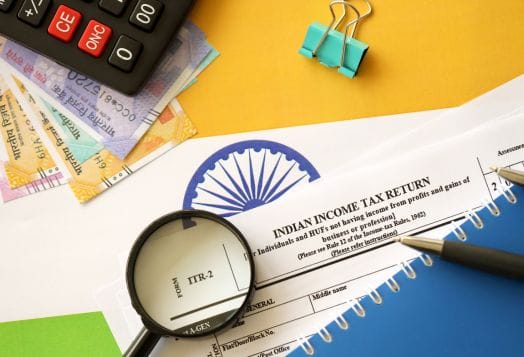A Tax Identification Number (TIN) is like your unique key in India’s vast tax maze. It helps track taxes, simplify filings, and keep everything above board with the authorities. Curious about what TIN means and why it matters? Let’s learn more about this essential number.

What is a Tax Identification Number (TIN)?
Imagine every taxpayer having a secret code for taxes. That’s exactly what a Tax Identification Number (TIN full form) is. It’s a unique number assigned by the tax authorities to track your tax responsibilities in the grand system of finance.
For businesses, TIN was used for VAT/CST, but now GSTIN is used for GST compliance. For individuals, especially salaried or self-employed, PAN is the only relevant tax identification number for income tax purposes, as explained in a beginner’s tax guide.
Your taxpayer number plays a key role whether you're paying taxes, claiming refunds, or just trying to stay on the right side of the Income Tax Department.
Importance of TIN in Tax Compliance
Let’s be honest, taxes aren’t exactly fun. But the tax identification number makes it all a little less confusing
TIN for Businesses: (Now replaced by GSTIN)
Earlier, TIN was used for VAT-related identification.
With the rollout of GST, TIN has been replaced by the GSTIN, a unique 15-digit number that every GST-registered business must have.
GSTIN is now your primary tax ID for filing returns, claiming input credits, and staying audit-ready.
TIN for Individuals: (Now PAN does the job)
For individuals, especially salaried or self-employed professionals, PAN has taken over as the key identifier.
PAN links all your income, investments, high-value transactions, and tax filings.
If you’re registered under GST as an individual or sole proprietor, you’ll have both PAN and GSTIN, together replacing the need for a separate TIN.
So, Where Does TIN Stand Now?
While the traditional TIN system is no longer used under GST, the concept of a unified tax identity remains vital. PAN and GSTIN now serve that purpose — giving each taxpayer a clear, trackable presence in the digital tax ecosystem.
TIN Readiness Quiz: Are You Tax-Savvy Enough? 1. Where can you find your TIN number if you’re a registered business? A) On your VAT/GST certificate B) It comes by email automatically C) On your birth certificate 2. Which tax document is essential for interstate business transactions in India? A) PAN B) Aadhaar C) TIN 3. How confident are you about filing taxes correctly using your TIN? A) Very B) Somewhat C) Not at all Quiz Results: Mostly A’s - TIN Mastermind You know your tax stuff! Mostly B’s - TIN Rookie You’ve got the basics down, but there’s room to level up. Mostly C’s - TIN-y bit confused Things are a bit fuzzy, but that's okay. |
How to Get a Tax Identification Number (TIN)?
If you’re wondering how to get a tax identification number in India, you’re not alone. The process is simpler than it sounds.
For Individuals:
Individuals typically require a PAN (Permanent Account Number), which serves as their tax identification number. However, if you’re a business owner or registered under GST for any reason, you will also have a GSTIN (GST Identification Number).
For Businesses:
Under the GST regime, businesses no longer use the old TIN for VAT registration. Instead, all businesses must register for GST and receive a GSTIN, which is now the primary tax identification number for business transactions and tax compliance in India.
To apply for a GSTIN, businesses can visit the official GST portal and fill out the registration form online.
Documents needed:
PAN card (for individuals or business owners)
Business registration certificate (for businesses)
Proof of address
Bank account details

Where to Find Your Tax Identification Number (TIN)?
Misplaced that piece of paper? Don’t panic, here’s where to find TIN with ease:
For Businesses:
Once you register for GST, you receive a unique GSTIN (Goods and Services Tax Identification Number). This 15-digit alphanumeric number is your official tax identity under GST and is crucial for all tax-related processes. Your GSTIN is printed clearly on your GST registration certificate, which you receive after successfully registering on the GST portal. You can also find your GSTIN by logging into your account on the GST portal.
For Individuals:
For most individuals who are salaried or have personal income, the PAN (Permanent Account Number) remains the primary tax identifier used for filing income tax returns and other personal tax matters.
Common Uses of a TIN
Now that you’ve got your GSTIN, what’s next? Think of it as your backstage pass to India’s financial system.
1. Filing Taxes
One of the most fundamental and important uses of a Tax Identification Number is for filing taxes.
If you’re a business owner, your TIN (or GSTIN) is required to submit your tax returns using the new income tax e-filing portal. This includes declaring your sales, purchases, input tax credit, and tax collected.
Even individuals who run businesses or are registered under GST will need to quote their TIN when submitting tax returns related to their business activities.
2. Business Transactions
In the world of commerce, the TIN functions like your identity badge. It’s required on various documents related to business transactions, such as:
Invoices and Bills
Purchase Orders
Sales Receipts
Inter-state transactions involving VAT or GST
This ensures that every sale or purchase you make is properly recorded with the tax authorities, allowing them to track the flow of goods and services.
3. Claiming Tax Benefits
Want to make sure you don’t overpay your taxes? That’s where your tax identification number helps again. By quoting your GSTIN on eligible transactions and filings, you can:
Claim input tax credits for GST paid on purchases
Get VAT refunds (if applicable under older systems)
Access deductions or rebates related to business expenses
Validate your eligibility for tax reliefs under the income tax provisions
But without your TIN, the Income Tax Department can’t identify you as the rightful taxpayer entitled to those benefits.

4. Tracking Tax Liabilities
The tax authorities use your GSTIN to monitor and track your tax liabilities, how much tax you owe and when it’s due. This digital trail of transactions, linked by your TIN, creates a clear financial picture of your business or taxable income. It helps prevent duplicate filings, underreporting of sales, tax evasion or fraudulent returns. It also makes it easier for you to reconcile your books, respond to audits, and manage compliance more confidently.
The Power of GSTIN
A Tax Identification Number (TIN) plays a vital role in India’s tax ecosystem. It's your key to smooth, legal, and efficient tax filing. It ensures that individuals and businesses are properly identified, tax records are accurately maintained, and legal compliance is upheld. Whether you're filing GST, claiming tax benefits, or documenting business transactions with help from tax planners, having a TIN simplifies the process and builds trust with the tax authorities.
Disclaimer: The information provided is intended for general informational purposes only. It is not a substitute for professional advice or guidance. For personalised recommendations or specific concerns, please consult a certified professional.




